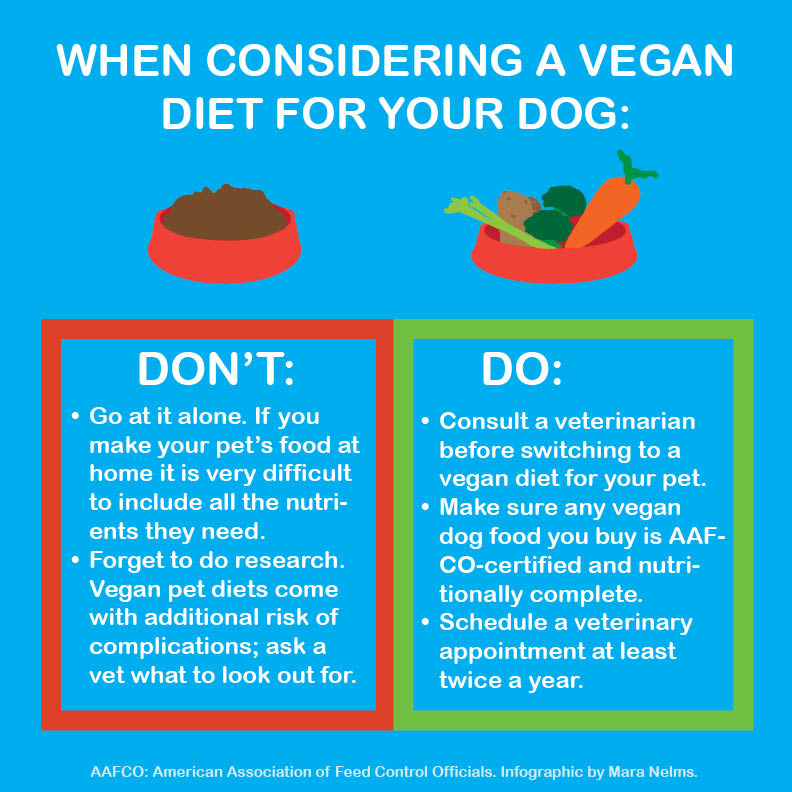Brown rice, peas, carrots, spinach, potatoes. Throw in a little seasoning, and it sounds good, right?
It’s actually an ingredient list for a type of dog food.
Notice anything missing from that list?
That’s right—there’s no meat.
That was a list of common, main ingredients in vegan dog food, a trend in pet diets that pet food sellers have begun to find a market in.
In a 2019 study, roughly 30% of vegan respondents fed their pets a plant-based diet. The study indicated that although interest among vegans in plant-based pet food is high, so is concern about whether such a diet could meet nutritional requirements for their pets — how much harder is it to keep a dog healthy on a plant-based diet?
Why It’s Newsworthy: According to a Gallup poll, veganism in the United States rose by 1 percent from 2012 to 2018, meaning that fewer than one in 10 Americans are vegan. Sixty-eight percent of Americans own pets, so if 30% of the pet-owners among the 30 million vegans in the U.S. feed their pets vegan diets as well, that could still be around 6 million people feeding their pets a plant-based diet.The Vexes of Veganism
If the idea of vegan dogs confuses you, you’re not alone. After all, dogs are carnivores, right? They need to eat meat.
That’s not quite the case. Dogs are facultative carnivores, which means they can digest and derive nutrients from non-meat sources as well. The trick is ensuring they get all of the nutrients they would usually get from meat in a diet without it, and that can be difficult.

“While I won’t say I will never say that a dog could be fed a vegan diet over the counter, right now, I’m reluctant to recommend them,” said Sherry Sanderson, an associate professor who teaches animal nutrition at the College of Veterinary Medicine at the University of Georgia.
“It would be very difficult to feed a truly vegan diet to a puppy or a pregnant bitch,” Sanderson said, because those dogs require two fatty acids, docosahexaenoic acid (DHA) and eicosapentaenoic acid (EPA), which are typically found in fish oils.
“Right now, [DHA and EPA are] only required in the diet for puppies or pregnant bitches, but my guess is that down the road, that’s also going to be a required nutrient for adult dogs,” Sanderson said.
“You can get it from algae, but from what I understand, it’s quite expensive,” Sanderson said. “Before we start using algae as a source of EPA and DHA, the research first needs to be done with that particular ingredient in pet food.”
Potential Dangers in Diet
Additionally, the U.S. Food and Drug Administration is currently investigating potential links between the presence of legumes in dog food and instances of dogs developing canine dilated cardiomyopathy (DCM), a condition in which a dog’s heart enlarges and becomes harder to pump. It can lead to congestive heart failure.
Legumes include peas, beans, chickpeas, peanuts and soybeans, all common alternative sources of protein used in dog food. These ingredients are common both in vegan and vegetarian dog foods and in grain-free dog foods. The FDA has not yet identified what might link legumes in dog food with the development of DCM.
Whatever the cause, Sanderson blames irresponsible science from pet food producers for the increase in cases.
“You need extensive and long-term studies done in dogs to show that it’s going to be providing what it needs and not causing problems. What we’ve seen right now with the surge in all these grain-free [diets] is they formulated foods and then used consumers’ pets as their test subjects,” Sanderson said.
Although the exact cause is not known, Sanderson said they do know these cases of DCM are nutrition-related.
“If it’s a primary cause, they succumb to that disease and it just progresses,” Sanderson said. “If it’s a secondary cause, which nutrition-related dilated cardiomyopathy is, there’s a chance for them to reverse. We’ve been seeing cases reversing by taking them off the diet.”
Pet Owners Weigh In
Sarah Segal, 48, just moved back to Athens from Los Angeles. She feeds her dog vegan dog food and knows “loads of others” who do as well.
“I have a veagle—a vegan beagle,” Segal said about her dog, Boomer.
Her “veagle” has been on a vegan diet since she adopted him when he was five. He is now nearly 15 years old.
“If a person is vegan, then there is no reason not to feed their beloved companion a vegan diet,” Segal said.



However, not everyone agrees that vegan dog food is a no-brainer — the higher price point can be pretty dissuasive.
A 28-pound bag of Natural Balance Dry Dog Food, the brand used by Segal, costs $52 on Chewy.com. A 28-pound bag of dry dog food made with chicken and rice is only $35.
And not all vegans are interested in extending their avoidance of animal products to their pets, who have no say in the matter either way.
Candace Holder, a vegan local to Athens, would not consider feeding her dog or her two cats a vegan diet.
Her concern isn’t about nutrition.
“They don’t choose to be taken in and fed by humans. It’s not my family’s place to change their diets so radically on the basis of our own beliefs and diet choices,” Holder said.
But Holder doesn’t think it’s an impossible task.
“I have heard about plenty of people that raise their pets on a plant-based diet and they are healthy and thriving. I am sure it’s possible,” Holder said.
Nevertheless, Holder is not interested. She said she would no more force a pet to eat a vegan diet than she would force another human.
It’s Complicated Kibble
On the whole, Sanderson believes that an over-the-counter vegan dog diet could be nutritionally sufficient, but she’s cautious.
“Especially with dogs and cats, when the pet food is often a major component or the sole source of food that they eat, we want to make sure that it is complete and balanced and provides everything they need,” Sanderson said.
She emphasizes the difficulty of formulating nutritionally complete pet food.
“My analogy is you go to the farmers market, and I’m all for buying vegetables and stuff there and supporting small business, but I don’t think very many of us would want to go to the farmers market and purchase a car. We want a team of experts behind who’s making that car,” Sanderson said. “That’s the same as what we want for pet food.”
Formulating a pet food requires input from experts like nutritionists and food specialists, but also toxicologists, microbiologists, food packaging specialists, and more.
Pet food formulation is a science. And until there’s plenty of science to say vegan dog diets are safe, experts recommend exercising caution when considering one for your pet.
Mara Nelms is a senior majoring in journalism in the Grady College of Journalism and Mass Communication at the University of Georgia.










Show Comments (5)
Alex
It looks more like a marketing post and less informative. I was expecting some genuine information.
North Wreckers
Thanks for an amazing article. Keep sharing!
petslovefresh
Make sure you give your pet a food that’s intended for that particular animal. Do some research or take help from pet nutrition experts.
David
A fair examination of a new emerging marketing strategy, which could have very little to do with a dog’s health and longevity, but more to do with separating more money from a well meaning person’s wallet.